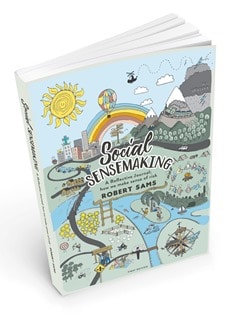Sensemaking and ‘Hapori’ – Essential for Tackling Risk in New Zealand
These are the (wise) words of Graham Long, the Pastor and CEO of The Wayside Chapel in Sydney’s Kings Cross; an example of a community who practice, rather than simply preach about, their mission which is:
“…creating community with no ‘us and them’. We do this by breaking down the barriers of judgement and providing a safe place where people from all walks of life are welcome.”
The Wayside is a special place for many. It’s not hard to feel the spirit of their mission and the strength of their community as you enter the building. However, the spirit of The Wayside lives beyond the walls of the Chapel itself, it embraces all who are part of its broad, diverse and inclusive congregation. It has meaning outside a building; it’s the philosophy of The Wayside that makes it a special place. Why is this?
Perhaps it’s because we are social beings who crave and long for connection and loving relationships, and The Wayside connects with these needs for those who share in its purpose? After all, The Wayside understands that being in community and sharing with others, is critical for our wellbeing. Their philosophy is built upon relationships, as much as its bricks and mortar.
This philosophy too is at the heart of ‘social sensemaking’, a phrase coined to highlight the social nature of the way we make sense of our world. Social Sensemaking is a way of being and comprehending our world. It is a worldview and an ontological understanding, rather than simply just another method.
So, what is sensemaking?
Christian Madsbjerg in his instructive book Sensemaking (2017, p.xxi), describes it as;
“…an ancient practice of cultural inquiry, a process based on a set of values we are in great danger of forgetting. With sensemaking, we use human intelligence to develop a sensitivity toward meaningful differences – what matters to other people as well as to ourselves.”
He also describes it as about;
“…rigorous cultural engagement”
With these points made, I join Madsbjerg in arguing that ‘sensemaking’ is a social activity. It is a way of being and doing, not some ‘thing’ we achieve. Social Sensemaking is an ongoing activity that moves beyond a simplistic and cognitive understanding of our world; to one that is multifaceted, rich and holistic. What is an example of this?
Indigenous cultures in particular seem to understand, and practice, this way of being. As I’ve written about previously, when we converse, share and live for the purpose of community and togetherness; we move toward a more holistic life of ‘us’, rather than an individualistic world of ‘me’. The Māori culture in New Zealand seem to understand this well. What do I mean by this?
Hapori is the word from their traditional language that can be interpreted as meaning a form of community or section of a kinship group, family and society. Like our local indigenous brothers and sisters in Australia, the Māori’s know well the importance and power of being in community with others. It seems to make sense to them; socially that is, rather than just through the simplistic lens of individual thought.
For example, as an indigenous friend recently told me:
“When one of us is sick, our whole community is sick”

Would you like to join us in ‘Social Sensemaking’ and experience ‘Hapori’ in New Zealand?
All of this, and more will be discussed during our Social Sensemaking one day workshop being held in Auckland, New Zealand on 14th May. We will share some of the challenges of moving toward a more holistic understanding of life (and risk), as well as provide tools that can support a move in this direction.
Specifically, the Workshop will focus on three key areas of (social) sensemaking including:
· Better understanding ourself in order to understand (and communicate with) others
· The role of the non-conscious in communication.
· Making sense of risk – a social perspective
Would you like to learn more about the Workshop and book a place? You can do so HERE.
I’d love to join in community and share in learning together with you.
Author:
Robert Sams
Email: robert@dolphyn.com.au
Web: www.dolphyn.com.au




Do you have any thoughts? Please share them below